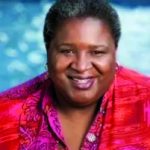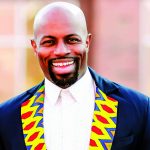
By Carrie Johnson ’24, Contributing Writer
The identity of Austin College centers on life-changing learning experiences for its students. The College’s Diversity, Equity, and Inclusion program has been refocused and refined to ensure that all Austin College students have equal possibilities to discover transformative moments that change their lives— and then, their world. Many of these experiences happen beyond the classroom. Learning includes action, but begins with conversation, so students on campus are sparking conversations around respecting and nurturing differences in themselves and others.
Through the work of the DEI office, student organizations, and Dr. Carllos Lassiter, Vice President for Student Affairs and Chief Inclusion and Diversity Officer, Austin College is on a powerful path of growth.
Diversity, Equity, and Inclusion office intern Kaitlyn Malone ’23 is completing a Chemistry major with a Spanish minor and is on the Pre- Med track. She relates the phrase “transformative experience” to her own opportunities at Austin College and says she doesn’t feel limited because she is a young black woman. “I feel like the classroom is open, opportunities are open,” she said. “Do you have to kind of hunt for them and ask questions for opportunities? Yes, but just knowing that people see you as more than what meets the eye is important.”
Austin College has what is called a minority majority with 51% of the students identifying as non-white. They include Latinx (Hispanic), AANAPI (Asian American, Native American, and Pacific Islander), Black, and multiracial.
Diversity in the college context means to include or involve people from a range of different social and ethnic backgrounds and of different genders, sexual orientations, etc. As affirmed by the data on student population, the Austin College student body is diverse.
Inclusion has two definitions—one is the practice or policy of providing equal access to opportunities and resources to people who might otherwise be excluded or marginalized, such as those who have physical or mental disabilities and members of minority groups, and the second definition is the action or state of including or of being included within a group or structure.
Equity is the quality of being fair and impartial. The goal of Austin College DEI programming is to be fair and accepting of all people.
However, sometimes diversity, equity, and inclusion can be uncomfortable for people to talk about, Lassiter says. In response to that, the DEI program is on a mission to ignite meaningful conversations among students, faculty, and staff. Lassiter has created a foundational framework of events to introduce basic concepts to the College community.
Lassiter and volunteers from the campus are facilitating 12 sessions, which began in September 2022 in partnership with the Johnson Center for Faculty Development and Excellence in Teaching. The November 2022 session was the annual campus-wide Cunningham Lecture and featured Justin Jones-Fosu, the author of The Inclusive Mindset: How to Cultivate Diversity in Your Everyday Life. These sessions, continuing through April 2023, are opportunities for staff to learn about DEI terminology, initiatives, and ways they can better serve and support marginalized students on campus, Lassiter said. The Faculty Learning Series explores DEI issues that impact students’ learning on campus.
Sessions for students are designed so they can engage with each other despite a difference of perspective and identity, foster intergroup community that includes diverse identities, explore personal experience and societal issues, and supply tools for navigating differences among people on and off campus.
Kaitlyn said, “I really just hope students come and advocate for themselves and know there’s a platform ready for them to speak on. I feel like there can be a lot of traditionalism in the classroom sometimes, so just having people get the sense that things are changing, the world is changing. I need to learn to adapt and learn what’s going on and not just be stuck in my ways.”
At Austin College, several student organizations based on culture and interests, including Black Expressions, Indian Cultural Association, La Familia, Asian Student Association, CHAMPS (Cultivating, Helpful, Aware, and Mindful People of Service), and the Gender-Sexuality Alliance, are vital to spreading awareness and learning to adapt.
Janaye Scales ’24 is completing a major in Political Science and a minor in East Asian Studies. She serves as Secretary for Students Today, Alumni Tomorrow and as President of Black Expressions. Black Expressions aims to foster a community for African American students and spread awareness about Black culture at Austin College.
By encouraging conversation between faculty, staff, and students, Janaye believes fear can be overcome. She says conversations can continue— not just talking about issues once, but discussing them several times through the days, weeks, and months—consistently moving the effort forward.
“These sessions for Austin College will make student life feel more open for the minority and marginalized groups on campus in case they didn’t feel that way prior to the establishment of DEI,” Janaye says. “In regard to Black Expressions, by fostering discussions about things like race and gender and sexuality, all those topics, I think it’ll make students feel like there’s a safe space where they can speak out and not stay silent about these things on our college campus.”
Helping create these safe places as the DEI intern, Kaitlyn is excited to put her fingerprint on certain projects like the Social Justice Film Series. The series will feature films such as 13th: A Film Exploring Racial Injustice that illustrate and advocate for diversity. The documentary explores the intersection of race, justice, and mass incarceration in the United States and is titled after the 13th Amendment of the Constitution, which abolished slavery in 1865.
Additionally, Kaitlyn, who is pursuing a medical career, believes her internship with DEI is powerful for her future. “I think, for me,” she said, “I really wanted to learn about diversity in different areas such as gender, sexuality, and disability, because I feel like you hear about it, but do you actually know what it entails? So, just having that insight on how to approach situations and to have an open mind I feel is definitely useful in the medical field because you’re going to be working with people of all different backgrounds.”
Both Janaye and Kaitlyn believe Austin College is making strides and can continue by promoting DEI and recruiting and including students who would receive help from the programming.
“We’re not afraid to tackle these hard discussions that need to be had,” Janaye said.
These sessions prepare the campus community for a more connected world that stems from the hearts and minds of the students, faculty, staff, and alumni. The enlightenment provided through the DEI program strengthens the accepting atmosphere that Austin College already fundamentally provides. Transformative experiences are on the horizon, and Austin College offers opportunities and hope.
Carrie Johnson ’24 is majoring in English and Media Studies to pursue a career in journalism and broadcasting. She is a Chickasaw and Pawnee Native American who was selected in summer 2022 as one of seven students nationwide as a fellow for the Native American Journalists Association. She attended seminars and was fully funded to attend the National Native Media Conference in Phoenix, Arizona. She is now an intern for the Chickasaw Press and was recently selected to a cohort on the NPR Next Generation Radio Project out of Oklahoma City. She was also a fellow for Investigative Reporters and Investigators and virtually attended the DBEI (Diversity, Belonging, Equity, and Inclusion) Symposium in October 2022. On campus, Carrie is a student-athlete, staff writer for The Observer, and an intern for Institutional Marketing and Communications.



